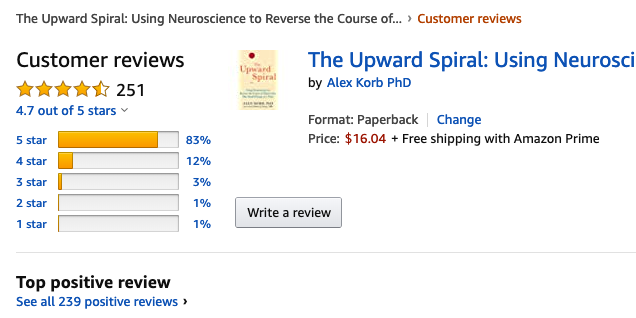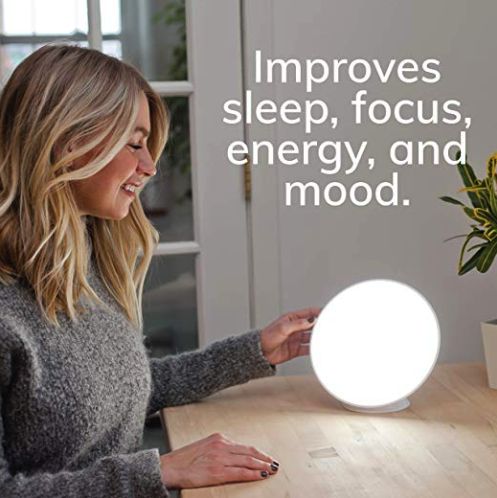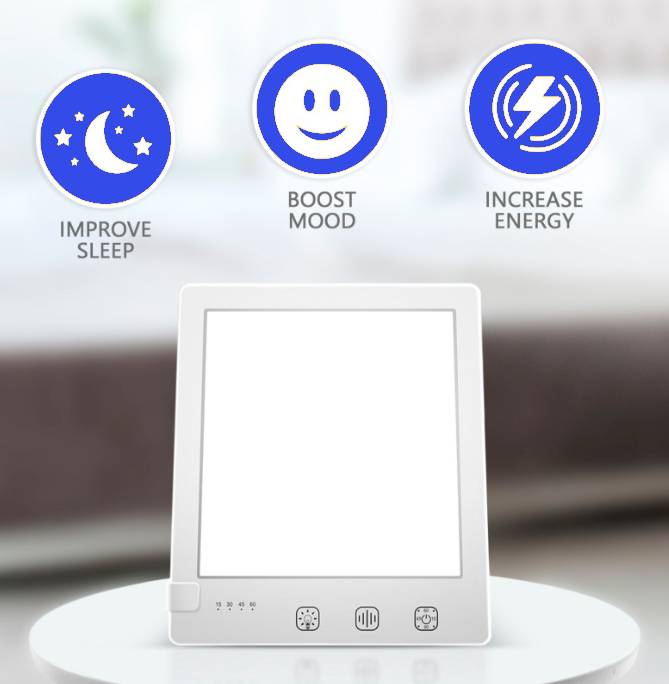Overcome Depression with a Lamp and Without Medication?
Yes there is science about how to naturally improve our mental health without prescriptions. This is important especially since depression is on the rise.
The chart below is from of a report by the Blue Cross Blue Shield, an insurance company who examined their data base of 41 million Blue Cross Blue Shield commercially insured members per year from birth to age 64 in the USA from 2013-2016. Their chart shows depression is increasing.

Source: https://www.bcbs.com/the-health-of-america/reports/major-depression-the-impact-overall-health
Depression is on the rise and not just with the adults.
More people are diagnosed with depression at a younger age.
A challenge with depression is that it is recurring. If people are suffering from depression now, they'll likely experience it again.
What can you do to maintain your mental health or reverse the course of depression without taking medications?
Neuroscientist Dr. Alex Korb, has written a book about how we can take small actions to reverse the course of depression and change our brains. Before doing any brain changes, let's talk about the forward, which is written by professor Daniel J. Siegel.
'Our experiences, including what we do with our minds, actually change the activity and even the lifelong remodelling of our brains.'
- Daniel J.Siegel, MD and author of 'The Yes Brain,' 'Brainstorm, Mindsight,' 'The Developing Mind,' 'The Mindful Brain,' and eighty more. (84 books!)

Here is a Daniel Siegel quote from the forward...
'Whether you or someone you know is prone to excessive ruminations, self-deprecating inner commentaries, or outright depressive moods, or you simply want to enhance your life by using incisive knowledge about your brain to make life more understandable and enjoyable, this book will be a gift along your journey.'
The book he is mentioning has helped hundreds to prevent a downward spiral into depression. 'Upward Spiral; Using Neuroscience to Reverse the Course of Depression One Small Change at a Time.'
by Dr Alex Korb Ph.D., forward by Daniel J Siegel, MD
'There isn’t one big solution to depression, but there are numerous simple steps you can take to alter brain activity and chemistry. Small steps in the right direction can have profound effects - giving you the power to become your best self as you literally reshape your brain, one small change at a time.’ Alex Korb Ph.D
It's also received hundreds of good reviews and counting.
This book is written in two parts.
Part one is an overview of what's going on the brain in people with depression, brain chemicals of depression, brain anatomy of depression and greater detail about the pre-frontal cortex, the limbic system and how those parts communicate.
Author Alex Korb Ph.D. writes: “…depression is primarily a result of poor communication between the thinking pre-frontal cortex and the emotional limbic system. Together these parts of the brain are often called the fronto-limbic system. The fronto-limbic system regulates your emotional state, and when not functioning, it well can push you into depression.” pg 17 The Upward Spiral
A goal in being able to reverse depression is to improve the communication in the fronto-limbic system.
Another way to look at it is that the prefrontal cortex is like a lion tamer and the limbic system is the lions.
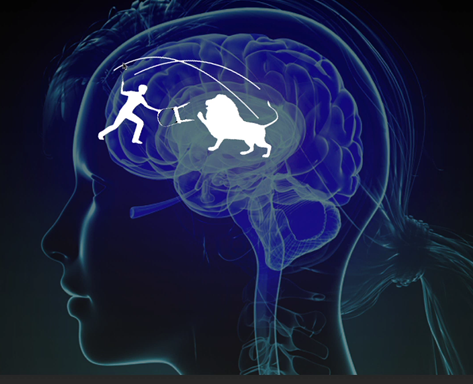 Or the PFC is the boss and the limbic system represents the employees. Or the PFC is the General and the Limbic system is the soldiers. Research frequently shows how this communication is a critical key for making changes in brain chemistry.
Or the PFC is the boss and the limbic system represents the employees. Or the PFC is the General and the Limbic system is the soldiers. Research frequently shows how this communication is a critical key for making changes in brain chemistry.
The second part of the book is about what you can do to make small changes for the better, based on what is known about the brain.
How to Change the course of Depression without Medication:
Gratitude
'...gratitude actually reduces the likelihood of suicidal thoughts' '...the effect of gratitude is greatest in people with the highest levels of hopelessness. When everything appears bleak and meaningless, a little gratitude goes a long way. Gratitude also reduces anxiety.' - The Upward Spiral pg 152
'Strengthening that (gratitude) circuit brings the power to elevate your physical and mental health, boost happiness, improve sleep, and help you feel more connected to people.' - The Upward Spiral pg 152.
'The benefits of gratitude start with the dopamine system, because feeling grateful activates the brain stem region that produces dopamine.'
Is it hard to feel grateful when feeling depressed? Yes! 🙁
But you can find a way to do the harder thing and strengthen your prefrontal cortex by finding things to be grateful for.
Want an easier way reduce depression and fight insomnia?
Solution: a gratitude journal.
'In a Canadian study (Effects of Constructive Worry, Imagery Distraction, and Gratitude Interventions on Sleep Quality: A Pilot Trial) a group of college students suffering from insomnia were to keep a daily gratitude journal for a week. This simple intervention led to improved sleep, reduced physical problems and less worrying.' - pg 156 The Upward Spiral.
You're grateful to know this, as am I, but you might be more grateful to know that gratitude also works to ease chronic pain. 'Even people with chronic pain (Differential effects of gratitude and sleep), gratitude improved sleep and reduces anxiety and depression.' - pg 156. The Upward Spiral.'
A Swiss study of 962 adults (Examining the Pathways between Gratitude and Self-Rated Physical Health across Adulthood) found that people who expressed more gratitude had better physical health and psychological health and were more likely to do healthy activities. Grateful individuals experience a wide variety of social and psychological health benefits (Designing Positive Psychology: Taking Stock and Moving Forward Kennon M. Sheldon, Todd B. Kashdan, and Michael F. Steger).
'Trying to think of things to be grateful for forces you to focus on the positive aspects of your life. This simple act increases serotonin production in the anterior cingulate cortex.' '... remembering sad events decreases serotonin production in the anterior cingulate.' - The Upward Spiral pg 156 Gratitude directly increases serotonin and indirectly keeps you from remembering negative events.
Laugh
Humor appreciation activates the dopamine-rich nucleus accumbens, as well as the brain stem region that produces dopamine. - pg 158 The Upward Spiral.
There is an Oscar winning movie called 'Life is Beautiful' about a father and son imprisoned in a concentration camp during World War II. The dad reframes the experience in an entertaining way so the kid has no idea about the actual horror of their environment. By reframing events, you change their meaning. If it's been a long time since you've laughed, Youtube has cat videos. Any form of laughter is better than none. I don't think laughter counts as medication, although as far as medicine goes, laughter may be one of the best. 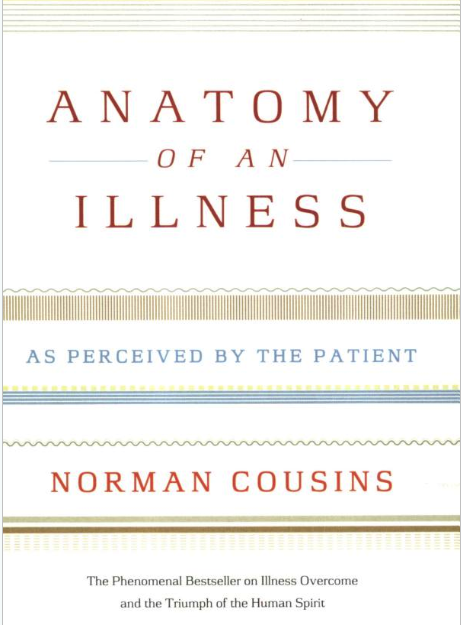
Another example of laughing and overcoming illness involves ankylosing spondylitis. This is like arthritis of the spine.
Norman Cousins had this. Upon hearing the news he decided to laugh his way to health by watching old Marx brothers movies, Candid Camera and various cartoons. He was the first person to heal from this disease and he turned it into a best selling book called 'Anatomy of an Illness: As Perceived by the Patient'. Laughter has healing properties and it comes with dopamine so you probably can't O.D. from LOL, but check with your doctor to make sure laughing is right for you.
People.
'..desire for solitude is just a symptom of the depressed brain, and it perpetuates the disease as the desire to not exercise perpetuates it.' - pg 161. The Upward Spiral. 'Talking, physical contact, or even just being near other people can decrease stress, pain, anxiety and depressive symptoms, and it can increase calmness and happiness.'
Being around people (movies, coffee shops, libraries, restaurants, markets, travel etc.) can enrich your cognitive map. Also, having a person to chat with makes it easier to bounce back. Individuals who interact regularly with a supportive friend, family member, or colleague are more resilient to stress. (Neural pathways link social support to attenuated neuroendocrine stress responses.)
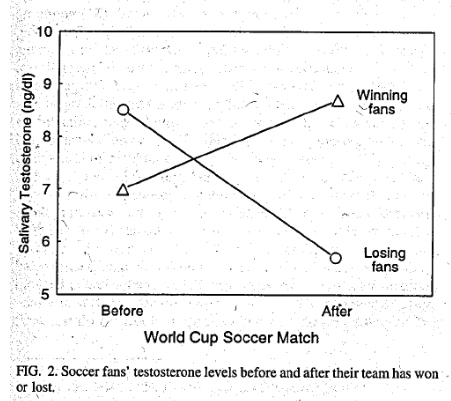 Here is another way that people can help you reverse depression and change brain chemistry. Watch a sport in a crowded place and cheer with the winning crowd.
Here is another way that people can help you reverse depression and change brain chemistry. Watch a sport in a crowded place and cheer with the winning crowd.
By feeling like you belong and that you're part of the champion team increases testosterone, boosts energy and sex drive. (Testosterone Changes During Vicarious Experiences of Winning and Losing Among Fans at Sporting Events) You might hate all sports, but you love maintaining your mental health naturally.
Go, random sports person representing us!!!
Develop Good Habits
Using willpower can be exhausting. It's easier to do things habitually. 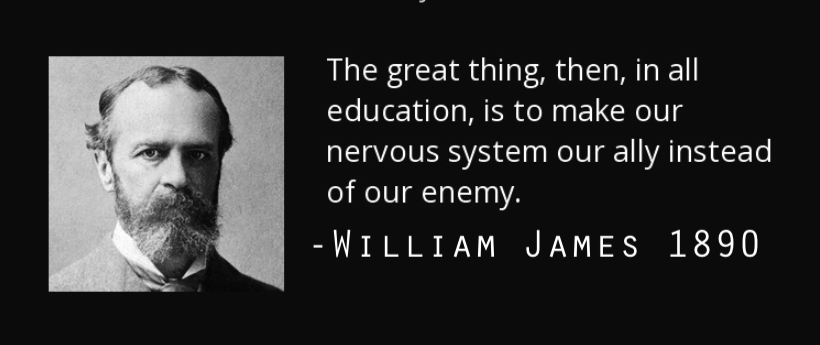 Deciding which habits to quit and which ones to begin requires the Prefrontal Cortex. Ideally you'd want to use less willpower and more of the habits you've planned to cultivate.
Deciding which habits to quit and which ones to begin requires the Prefrontal Cortex. Ideally you'd want to use less willpower and more of the habits you've planned to cultivate.
How might this be done?
Self-affirmations. Repetition works! And it can be especially effective after evoking good feelings first. For example, a study was done in the United Kingdom on self affirmation and smokers. (Self-affirmation increases acceptance of health-risk information among UK adult smokers with low socioeconomic status). This research had smokers in two groups. Group one has to answer a set of questions aimed at causing them to feel good about themselves. The second group answered neutral questions. Both groups then read information on the negative effects of smoking. The smokers in the 'feel good' group developed a greater intention to quit smoking and were more likely to start looking into quitting. The effect was strongest in the heavier smokers. A couple of the warm up questions for the feel good group were:
Have you ever forgiven another person when he or she has hurt you?
Have you ever tried to cheer someone up who had a bad day?
Whenever the person said yes, they'd be asked to elaborate. This causes the person to think of their own goodness with greater depth. After getting people in this state, which is about calling forth the brain chemistry related to experiences of core value, and then presenting them with the 'no smoking' literature, more stopped.
Recalling memories where you did some nice stuff in your life makes it easier to take care of yourself because you're recalling many reasons why you're worth it! And if you're recognizing how valuable you are, you're likely taking care of yourself by reducing harmful thinking and are in the present more, generating better states of being.
Try out the Reprogramming Mind free affirmations and downloadable MP3's which are a great habit to start and end your days with.
YES/NO More.
Make More Decisions. Generals, bosses and lion tamers make decisions. The more decisions you make, the more you're using your prefrontal cortex. Deciding is a difference that makes a difference so pull the trigger, press the button or crack the whip but in general, decide more often so that you can rebuild your brain architecture in more resourceful ways.  'Decision making is a great way to start an upward spiral, because it engages a circuit that helps you get better. Intentional, goal directed decisions require the use of the prefrontal cortex, specifically the ventromedial prefrontal cortex, which helps rebalance the dysfunctional frontal limbic circuitry.' - The Upward Spiral pg. 95
'Decision making is a great way to start an upward spiral, because it engages a circuit that helps you get better. Intentional, goal directed decisions require the use of the prefrontal cortex, specifically the ventromedial prefrontal cortex, which helps rebalance the dysfunctional frontal limbic circuitry.' - The Upward Spiral pg. 95
Exercise
You can dance if you want to. You can also air guitar, do pushups or jumping jacks. Getting your body moving is a great way to get unstuck. 
And it works if you're over the age of 60 and suffer bouts of insomnia. 'Exercise improves sleep by synchronizing circulation rhythms, reducing stress, decreasing REM sleep, and inducing numerous neurochemical changes. (Aerobic exercise improves self-reported sleep and quality of life in older adults with insomnia.)
Sleep.
It's difficult to have some control of your emotions with a perfect amount of sleep. It's more difficult with poor sleep. Maintaining sleep hygiene will help reverse the course of depression. Nature seems to want humans to spend a third of life asleep. Let's go with that instead of fighting it by making time for exciting sleep plans! If you need to be in bed and dreaming by 11 p.m., that means winding down around 5 p.m., no chocolate, tea or coffee. Caffeine is good but sleep's better. Put the phone down at sundown to get your body clock somewhat lined up with day and night. Then saunter to the shower or hot bath around nine p.m, read a physical book around ten, ZZZ ~ eleven. It never works precisely like that, but having a range for consistency helps maintenance. Phone down at sundown without a cuppa Twinnings Earl Grey under a starry night seems impossible, but someone must be able to do it!
Put the phone down at sundown to get your body clock somewhat lined up with day and night. Then saunter to the shower or hot bath around nine p.m, read a physical book around ten, ZZZ ~ eleven. It never works precisely like that, but having a range for consistency helps maintenance. Phone down at sundown without a cuppa Twinnings Earl Grey under a starry night seems impossible, but someone must be able to do it!
What's sleep got to do with depression?
'- if you have insomnia, you're more likely to develop depression, and vice versa.' (The bidirectional association between depression and insomnia: the HUNT study.) 'Many people with depression have difficulty thinking clearly and being decisive, and these problems are exacerbated by sleep problems.' - The Upward Spiral. 113.
Nature Bathing.
Air, trees, water, leaves, sunshine, dirt. Is there an app for that? Squirrel! Spend some time in nature. It will help you get your attention span back and also increase contentment. Does that mean some remote tribe in Namibia would have a greater attention span and contentment because they spend all their time in the great African outdoors? Yes, exactly. 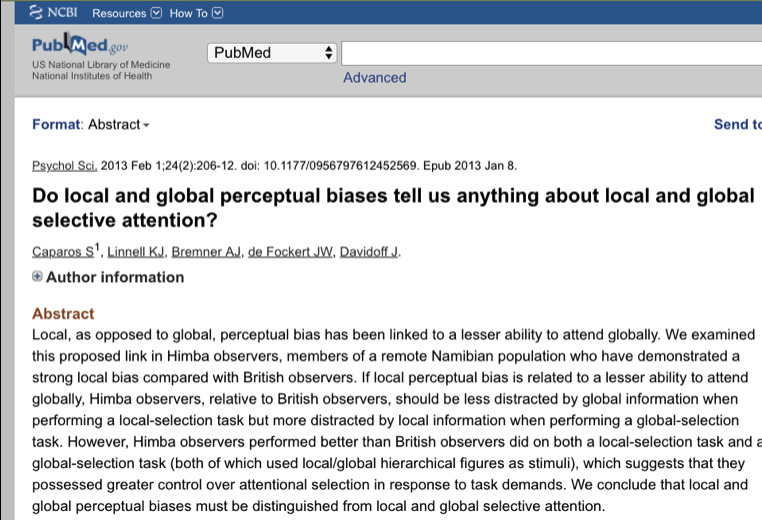 This study was already done at the University of London. The research had found that members of the Himba, a remote cattle herding tribe in Namibia, who spend their lives in the open bush, had greater attention spans and a greater sense of contentment than urbanized Britons. 'When those same tribe members moved into urban centres, their attention spans and levels of contentment dropped to match their counterparts.' {Citation 117}- Michael Harris -‘Solitude, a Singular life in a Crowded World.’
This study was already done at the University of London. The research had found that members of the Himba, a remote cattle herding tribe in Namibia, who spend their lives in the open bush, had greater attention spans and a greater sense of contentment than urbanized Britons. 'When those same tribe members moved into urban centres, their attention spans and levels of contentment dropped to match their counterparts.' {Citation 117}- Michael Harris -‘Solitude, a Singular life in a Crowded World.’
Another benefit of being outside is you can pick up some of that free vitamin D3. Around 40% of Americans have a vitamin D3 deficiency and this has been linked to depression. (Effects of vitamin D supplementation on symptoms of depression in overweight and obese subjects: randomized double blind trial.) Some controlled studies have shown that giving vitamin D to people who are deficient helps improve depression, including seasonal depression that occurs during the colder months. (Vitamin D and depressive symptoms in women during the winter: a pilot study.)
According to the American Academy of Family Physicians, about 4% to 6% of people may have Seasonal Affective Disorder. On Web MD it states, 'people in northern latitudes, where there are fewer hours of daylight, suffer more than those in southern latitudes. Women -- especially between the ages of 20 and 40 -- appear to be affected more frequently than men.'Seasonal Affective Disorder has some of the same symptoms as depression i.e. sadness and lack of energy. You might think sunshine is the answer? But what if you live in parts of the world where you'd rather not go out in freezing weather? Or what if there is limited sun like, Alaska?
Light Therapy
Light Therapy Lamp | 10,000 LUX
Fortunately you can bring some of that sunshine goodness indoors with a light therapy lamp. These special lamps have similar benefits of the sun and they work for treating SAD. (Exposure to broad wavelength white light is highly effective in the treatment of Seasonal Affective Disorder.)
What if you don't want to sleep, be social, spend time in nature, or use a therapy lamp, or eat your vitamins or take medications?
MBCT
What is MBCT?
Mindfulness Based Cognitive Therapy. This is about learning to use your brain with greater awareness. Paying attention to your breathing, the texture of eating a raisin, or listening to a hypnosis/meditation audio containing a 'Body Scan' induction are examples of MBCT.
Sam Harris, neuroscientist and best selling author, had guests Daniel Goleman and Richard Davidson, the authors of Altered Traits: Science Reveals How Meditation Changes Your Mind, Brain, and Body on his podcast. Harris asked what the neuroscience has shown about depression and mindfulness. If you have a minute, that's enough time to hear Richie Davidson's response on the state of the research related to MBCT and depression.
Here is a transcript.
Richard Davidson:
'Most of the work with depression has in fact been focused on mindfulness based cognitive therapy. Where it's particularly effective is in reducing the likelihood of depressive relapse. That's where the best data are. So if you take an individual who has had a history of depression, and one of the things we know about depression is that it's a recurring illness. Teaching a person mindfulness based cognitive therapy when they are remitted, has a dramatic impact on the likelihood of relapse and in fact, it's the one case where a mindfulness based intervention is actually more effective than medication.'
We are a participant in the Amazon Services LLC Associates Program, an affiliate advertising program designed to provide a means for us to earn fees by linking to Amazon.com and affiliated sites.
Navigating Heartbreak: 6 Steps Women Who End Up Happier After A Breakup Do During The Healing Process
Experiencing the pain of a breakup can feel like a rug being pulled out from under you. If you're struggling to move on, it's crucial to understand the stages of healing. In this post, we'll explore six essential steps to help you overcome the lingering effects of a...
How to Heal and Open Your Heart After a Breakup
Learn how to heal after a breakup and open up your heart again with these expert tips from a licensed therapist and life coach. Breaking up is hard to do. Whether you were the one who initiated the breakup or you were the one who was left behind, it can be difficult...
Habit Stacking Examples to Get Over a Breakup
Habit stacking can be a powerful tool to help someone recover from setbacks like breakups. The key is to incorporate positive habits into their daily routine to support emotional healing and personal growth. Here's an example of how someone can use habit stacking in...
Reclaiming Your Life: 11 Essential Steps to Thrive After a Long Marriage Ends
Navigating the tumultuous waters of divorce is never easy, and when it follows a long-term marriage, the emotional and practical challenges can be particularly daunting. The decision to end a marriage that has spanned many years is often accompanied by a myriad of...
How Long to Get Over a Breakup?
Some people have a breakup and are able to get over their ex and move on with relative ease. However, some, like myself, may have trouble getting over a breakup and not just for months. For some people it might take years or in the worse case scenarios, never. So...
12 Mental Toughness Books for a Resilient Mindset
Mental toughness is a psychological trait that encompasses resilience, grit, and the ability to persevere in the face of adversity. It is the capacity to maintain focus, determination, and a positive mindset when confronted with challenging situations, setbacks, or...


